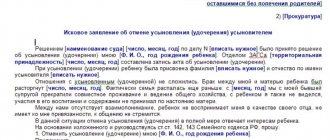On January 1, 2021, 218-FZ of July 13, 2015 “On State Registration of Real Estate” (hereinafter referred to as the Registration Law) came into force; the amendments to this law allowed realtors to claim that now the consent of the spouse is not required for the transaction. Is it so? Let's figure it out.
In accordance with the provisions of paragraph 15 of part 1 of Article 26 218-FZ of July 13, 2015 “On state registration of real estate”, state registration is suspended by decision of the state registrar of rights, including if the submitted documents do not contain confirmation of availability in cases provided for by federal law, consent to a transaction subject to state registration of a right, restriction or encumbrance of a right, a third party, a body of a legal entity, a state body or a local government body, if it follows from the federal law that such a transaction is void.
Transactions are recognized as actions of citizens and legal entities aimed at establishing, changing or terminating civil rights and obligations. (Article 153 of the Civil Code of the Russian Federation).
The legislation provides for 2 options for invalid transactions - a voidable and void transaction
.
What is invalidity of a transaction?
In essence, this is the non-occurrence of the outcome and result that the parties or one of the parties who entered into the agreement would have desired, but, on the contrary, the occurrence of such a result of the transaction that is required by law. In order to invalidate an agreement between the parties, it is necessary to take into account the nature of the violations committed during its conclusion. A voidable transaction and a void transaction are different.
Types of invalid transactions
According to paragraph 1 of Art. 166 of the Civil Code of the Russian Federation, an invalid transaction may be:
- Contestable - if the fact of its invalidity is established by the court.
- Void - if no corresponding court decision is required to invalidate it.
Voidable transactions are:
- concluded by organizations in violation of the limits of their legal capacity (Article 173 of the Civil Code of the Russian Federation);
- committed by a person or body whose powers are limited (Article 174 of the Civil Code of the Russian Federation);
- performed by minors whose age ranges from 14 to 18 years (Article 175 of the Civil Code of the Russian Federation);
- committed by persons whose legal capacity is limited (Article 176 of the Civil Code of the Russian Federation);
- prisoners who were not aware of their actions (Article 177 of the Civil Code of the Russian Federation);
- committed under the influence of a serious misconception that had a significant impact on the decision to sign the agreement (Article 178 of the Civil Code of the Russian Federation);
- committed as a result of coercion, expressed in the form of deception, violence, threats (Article 179 of the Civil Code of the Russian Federation).
The following transactions are void:
- prisoners in violation of the norms of current legislation (Article 168 of the Civil Code of the Russian Federation);
- violating the norms of morality and law and order (Article 169 of the Civil Code of the Russian Federation);
- imaginary and feigned (Article 170 of the Civil Code of the Russian Federation);
- prisoners with an incompetent (Article 171 of the Civil Code of the Russian Federation) or a minor (Article 172 of the Civil Code of the Russian Federation) person;
- committed in violation of the legal requirements for the execution of a transaction (provided that such a violation entails the recognition of it as void).
The consequences of recognizing a specific transaction as void/voidable depend on what consequences of invalidity of the transaction are provided for under the Civil Code of the Russian Federation.
What does it mean to invalidate a transaction?
The invalidity of a transaction means that the action committed by its parties cannot be recognized as a legal fact capable of entailing the legal consequences that they wanted to achieve. According to paragraph 1 of Art. 167 of the Civil Code of the Russian Federation, the conclusion of a transaction that is invalid does not entail any legal consequences, except for those directly related to its invalidity.
In the event that it follows from the essence of the contested transaction that its effect can only be terminated for future periods, the court, in accordance with paragraph 3 of Art. 167 of the Civil Code of the Russian Federation, terminates its effect only within these limits. At the same time, the previous legal relations of the parties and the results that arose as a result of their implementation continue to be regulated by the terms of the transaction that was declared invalid in court. This point of view is set out, in particular, in the decision of the Tomsk Region Arbitration Court dated October 31, 2016 in case No. A67-83/992015. Examples of such transactions include agreements for leasing property or transferring it to trust management.
What is a void transaction
A void transaction is a transaction that is carried out in violation of the basic rules for concluding transactions, that is, without complying with legal requirements. Such transactions are void.
Void transactions do not give rise to the rights and obligations of the parties
A transaction is invalid on the grounds established by law, due to its recognition as such by the court (voidable transaction) or regardless of such recognition (void transaction).
Art. 166 of the Civil Code of the Russian Federation
Signs of a void transaction
A void transaction may be called such if one or more of the following features are present:
- Direct violation of the Constitution, federal or regional law, as well as any other regulatory act.
- The transaction is contrary to the fundamentals of law and order and morality.
- The imaginary nature of the deal.
- Pretense.
- A person lacks proper legal capacity.
- The transaction was completed by an organization, but according to the law and charter, this legal entity does not have the right to enter into such agreements.
Finally, it is important to note that a void transaction can also be one that, at first glance, fully meets the requirements of the law in terms of content, but the form was not observed. For example, a pledge of a building, structure or housing, made in accordance with all the rules, but not certified by a notary, is void.
Thus, if there is a need to prove the nullity of a transaction, then the initiator can be any person whose rights or interests were violated during the execution of this agreement. Sometimes the initiator is the state, represented by the prosecutor, if the conclusion of a void transaction entails unfavorable consequences for the public.
Legal consequences of declaring a transaction invalid - what are they?
The consequences of an invalid transaction depend on the following factors:
- the stage of its execution at which it was recognized as such;
- the impact they have on existing norms of law and order and/or morality;
- presence/absence of profits/losses on its part.
In this case, several consequences are possible in legal practice:
- Cancellation (if the transaction was not executed).
- Restitution (if the transaction was executed in whole or in part), and it can be bilateral or unilateral.
- Non-application of restitution.
- Other property consequences (for example, payment of interest due to unjust enrichment or compensation for losses incurred by one of the parties to the transaction as a result of its conclusion).
If the parties did not fulfill their obligations, they will not have to take any additional actions in relation to each other, since the transaction is automatically canceled without the execution of additional papers. If the transaction was executed (regardless of the volume of fulfilled obligations), the question arises about the property consequences that it entails. The main consequence of the invalidity of a transaction of this kind is restitution.
Tax consequences of void transaction
An analysis of current judicial practice allows us to come to the following general conclusions regarding the application of tax consequences after qualifying the relevant transaction as invalid:
- recognition of the invalidity of a transaction in itself cannot entail a change in tax legal relations, except in cases where such a basis is directly provided for by the legislation on taxes and fees (for example, the resolution of the Autonomous Court of the Republic of Buryatia dated March 14, 2016 in case No. A10-3611/2015, etc.);
- the mere fact of qualifying a transaction as invalid is not a basis for making adjustments to tax liabilities, and their recalculation can be made only after the implementation of 2-sided restitution (determination of the Supreme Arbitration Court of the Russian Federation dated September 28, 2009 No. VAS-10263/09);
- tax obligations associated with the invalidity of a transaction arise for the taxpayer at the moment the relevant court decision gains legal force (for example, the resolution of the Arbitration Court of the Ural District dated September 15, 2016 in case No. A50-28459/2015).
Restitution of possession
From the norms of Art. 167 of the Civil Code of the Russian Federation it follows that a party that transferred certain property to its partner as part of a transaction that is invalid does not have to prove the fact that it has ownership rights to such property. Moreover, even if she does not have such a right, the thing previously transferred to a third party must be returned to her.
An example would be a situation in which a young child sells an expensive item that belongs to his parents (regardless of whether he was aware of the real value of this item at the time of sale or not). In this case, the item is returned to the child who sold it, despite the fact that his parents are formally and actually the owners.
When applying the rules of restitution of possession, it is worth remembering that the provisions of paragraph 2 of Art. 167 of the Civil Code of the Russian Federation cannot be applied if, prior to the presentation of demands for the return of the unlawfully transferred item, it was alienated in favor of a third party.
In this case, the consequence of an invalid transaction is not restitution, but vindication - the reclaiming of property from a bona fide purchaser (the procedure for its application is regulated by the provisions of Article 302 of the Civil Code of the Russian Federation). Violation of this rule entails infringement of the rights of purchasers who did not know about the true owner of the thing, and invalidation of the entire chain of completed transactions, and not just the primary agreement concluded in violation of the law. This point of view is set out in the resolution of the Constitutional Court of the Russian Federation “On the case of verification ...” dated April 21, 2003 No. 6-P.
Invalidation of the debtor's sham transactions: the conflict between the “covering” and the “covering”
Genesis
In paragraph 2 of Art.
170 of the Civil Code of the Russian Federation states: a sham transaction, that is, a transaction that was made with the aim of covering up another transaction, including a transaction on different terms, is void. To a transaction that the parties actually intended, taking into account the essence and content of the transaction, the rules relating to it are applied. However, this type of contestation in modern Russian history – until recently – was ineffective, which the legislator agreed with.
In the explanatory note to the draft amendments adopted in 2009 (Federal Law of April 28, 2009 No. 73-FZ) to the Federal Law of October 26, 2002 No. 127 “On Insolvency (Bankruptcy)” (hereinafter referred to as the Bankruptcy Law) , which contained innovations in terms of improving the provisions on competitive challenging of the debtor’s transactions during bankruptcy proceedings (which became Chapter III.1 “Challenging the debtor’s transactions” of the Bankruptcy Law), it was noted that the legislation of the Russian Federation in force at that time did not allow effectively challenging transactions aimed at for illegal alienation of property by the debtor on the eve of bankruptcy. Such transactions were contested mainly as fictitious (imaginary) or feigned, which in judicial practice did not bring the desired (positive) result for creditors and bankruptcy trustees, especially when challenging transactions of insolvent persons with unequal counter-performance.
Despite the fact that the provisions of Art. 61.2 of the Bankruptcy Law make it possible to counteract formal legal “multi-steps”; their purely economic nature of challenging does not always make it possible to identify multi-level “asset withdrawal” schemes, when a numerous set of transactions and civil law ( and, in particular, corporate legal actions, complicated by a complex subject composition.
The development of “smart” schemes for “withdrawal of assets” entailed the need for an adequate response from judicial practice.
Subject of proof
In paragraphs 87 and 88 of the Resolution of the Plenum of the Supreme Court of the Russian Federation dated June 23, 2015 No. 25 “On the application by courts of certain provisions of Section I of Part One of the Civil Code of the Russian Federation” it is explained: according to paragraph 2 of Art. 170 of the Civil Code of the Russian Federation, a sham transaction, that is, a transaction that was concluded with the aim of covering up another transaction, including a transaction on different terms, with a different subject composition, is void. In connection with pretense, only a transaction that is aimed at achieving other legal consequences and covers up the different will of all participants in the transaction can be recognized as invalid. The intention of one participant to make a sham transaction is not enough for the application of this rule.
To a transaction that the parties really had in mind (a covered transaction), taking into account its essence and content, the rules relating to it are applied (clause 2 of Article 170 of the Civil Code of the Russian Federation).
A sham transaction is also considered to be one that is concluded under other conditions. For example, when establishing the fact that the parties, in order to cover up a transaction for a large amount, made a transaction for a smaller amount, the court recognizes the transaction concluded between the parties as concluded for a large amount, that is, it applies the rules related to the covered transaction.
A covered transaction may also be declared invalid on the grounds established by the Civil Code of the Russian Federation or special laws.
When applying the rules on sham transactions, it should be taken into account that not only one, but also several transactions can be made to cover up a transaction. In this case, the cover transactions are void, and the rules relating to it are applied to the transaction that the parties really had in mind, taking into account its essence and content (clause 2 of Article 170 of the Civil Code of the Russian Federation).
For example, if the court finds that a participant in a limited liability company entered into a donation agreement for part of his share in the authorized capital of the company to a third party for the purpose of further selling the remaining part of the share, bypassing the rules on the preemptive right of other participants to purchase a share, the gift agreement and subsequent purchase - the sale of a part of the share can be qualified as a single purchase and sale agreement, completed in violation of the above rules. Accordingly, another participant in the company has the right to demand in court the transfer of the rights and obligations of the buyer to him (clause 2 of article 93 of the Civil Code of the Russian Federation, clause 18 of article 21 of the Federal Law of February 8, 1998 No. 14-FZ “On limited companies responsibility").
However, these clarifications did not solve the main problem - what to do with a covered transaction between the bankrupt and the final acquirer, even if the cover transactions were successfully challenged?
Problems of proof. Evidence guidelines
At first glance, in such disputes it is only sufficient to prove (or disprove) that the basis of the actual relations of the parties is a transaction other than the one named on the “paper” (a set of several “papers” that form the “formal document flow” so biasedly studied by Russian arbitration judges). in the “head” and “subject” of feigned civil contracts that hide the real deal between the parties.
Let us assume that during the trial it is established that the transaction or transactions/actions performed by the debtor and a group of persons in favor of the ultimate beneficiary, the defendant, are of a sham nature. Based on the literal interpretation of paragraph 2 of Art. 170 of the Civil Code of the Russian Federation, a transaction declared invalid only “opens” another transaction to which the relevant rules apply. Reclassification of a transaction for the sale and purchase of bills of exchange into borrowed obligations or a lease with the right to buy - into leasing - does not have any effect on the bankruptcy estate.
Successful challenge of cover transactions in itself does not indicate the possibility of successful challenge of cover transactions.
At the same time, it is also unclear to the defendant counterparties (in particular, the final acquirers of the debtor’s assets) what real arguments should be given in their defense?
To resolve these issues, it is necessary to use the following logical algorithm.
Step 1. Differences between “cover” transactions and “covered” transactions
At this stage, the following errors are made that can be corrected.
Mistake 1. Challenging cover transactions as independent.
How to fix it: challenge cover-up transactions as feigned ones, without giving them independent meaning.
Rationale : within the meaning of the rules of law and the documents explaining them given in the sections “Genesis” and “Subject of Proof,” a chain of successive sales transactions with different subject composition can cover up a transaction aimed at the direct alienation of property by the first seller to the last buyer.
The Determination of the Judicial Collegium for Economic Disputes of the Supreme Court of the Russian Federation dated July 31, 2021 No. 305-ES15-11230 in case No. A40-125977/2013 contains the following explanations in this regard.
In relation to a cover transaction, the parties to it, as a rule, prepare documents in such a way that an external person gets the impression that the parties are actually following the terms of the cover contract . relating to the transfer of actual control over property allegedly transferred under successive sham transactions are essential for the correct resolution of a separate dispute
The scheme of payments for property with the participation of related legal entities, the depravity of which the debtor cannot but know, indicates the emergence of a trust relationship between the persons who are members of the debtor’s bodies and these related legal entities.
A statement of the direct transfer of actual control over property from the debtor to the last acquirer is probable when the following circumstances are established in a separate dispute: membership of the beneficiary or its affiliates in the bodies of the bankrupt debtor, his approval of transactions for the sale of property, the presence of the mentioned payment scheme used and the established trust relationships, registration of the final transfer of rights to property to the beneficiary or his affiliates.
The presence of a trust relationship makes it possible to delay the legal consolidation of rights to property by virtue of an agreement or in the state register, explains the time gap between sham transactions and therefore cannot be considered as a circumstance excluding the nullity of transactions.
A covered transaction can be reasonably declared invalid by the courts as suspicious on the basis of clause 2 of Art. 61.2, Art. 189.40 of the Bankruptcy Law or on other grounds of invalidity, if the disputing person has proven the relevant legal composition of the facts.
Mistake 2. Challenging feigned “covering” operations as independent.
How to fix: a banking operation for the transfer of funds within the meaning of clause 4 of Art. 61.1 of the Bankruptcy Law is also a transaction that can also be a sham.
Rationale : The Ruling of the Judicial Collegium for Economic Disputes of the Supreme Court of the Russian Federation dated December 1, 2021 No. 305-ES15-12239 in case No. A40-76551/2014 contains the following explanations in this regard.
According to paragraph 2 of Art. 170 of the Civil Code of the Russian Federation, a sham transaction, that is, a transaction that was concluded with the aim of covering up another transaction, including a transaction on different terms, is void. To a transaction that the parties actually intended, taking into account the essence and content of the transaction, the rules relating to it are applied.
At the same time, the current legislation proceeds from the fact that a covered transaction can also be declared invalid on the grounds established by the Civil Code of the Russian Federation or special laws.
For example, contracts for the sale and purchase of property and securities, as well as controversial banking transactions, may be interconnected invalid transactions covering a single transaction for the withdrawal of the debtor’s assets in anticipation of his bankruptcy - the transfer of funds from the counterparty under the guise of the purchase of illiquid bills without endorsements and the gratuitous transfer of real estate to a third party. person under the guise of buying and selling it. Thus, the covered transaction was essentially challenged by the manager on the grounds provided for in paragraph 2 of Art. 61.2 of the Bankruptcy Law, as a transaction made for the purpose of causing harm to the property rights of the debtor’s creditors.
Error 3. Confusing the grounds for challenging corporate actions (for example, increasing the authorized capital) as both feigned (Article 170 of the Civil Code of the Russian Federation) and suspicious (Article 61.2 of the Bankruptcy Law).
How to fix: Separate the order of contestation. It is logical that with pretense, there is no corporate action and no real economic consequences, and the covered transaction is void under Art. 174.1 Civil Code of the Russian Federation; if a corporate action is real, this action should be checked as a suspicious transaction on economic grounds of invalidity.
Justification : in paragraph 18 of the Review of judicial practice of the Supreme Court of the Russian Federation No. 2 (2018), approved by the Presidium of the Supreme Court of the Russian Federation on July 4, 2021, Determination of the Judicial Collegium for Economic Disputes of the Supreme Court of the Russian Federation dated January 25, 2021 No. 301-ES17-13352 in the case No. A31-4923/2014 provides the following explanations regarding the verification of the decision to increase the authorized capital through an additional contribution from a third party.
Transactions involving the adoption by the sole participant of a business company of a decision to increase the authorized capital due to the additional contribution of a third party and the inclusion of this third party in the composition of the company's participants are subject to verification within the framework of the bankruptcy case of the sole participant of the company according to the rules of Art. 170 of the Civil Code of the Russian Federation - in the event that this third party actually fails to make a real additional contribution (or makes a symbolic additional contribution) or according to the rules of Chapter III.1 of the Bankruptcy Law - in the case of a third party making an additional contribution equal to the nominal value of the share acquired by him .
In a situation where the sole participant of a business company makes a formal decision to increase the authorized capital due to an additional contribution from a third party, this third party fails to make a real additional contribution (or makes a symbolic additional contribution), and when circumstances are established indicating the interconnectedness of the mentioned actions (inaction) and subsequent actions to leave the company of the former sole participant, redistribute his share in favor of a new participant, the corresponding transactions are subject to recognition as sham (Clause 2 of Article 170 of the Civil Code of the Russian Federation), covering up the direct gratuitous alienation of the share. In turn, a covert transaction made in violation of the provisions of paragraph 1 of Art. 174.1 of the Civil Code of the Russian Federation is invalid (void).
If, in pursuance of the decision to increase the authorized capital at the expense of an additional contribution from a third party, the latter made a contribution equal to the nominal value of the share received by him, the transaction to increase the authorized capital is subject to verification for compliance with the requirements of clause 2 of Art. 61.2 of the Bankruptcy Law.
Step 2. Independently challenging/independently defending the “covered” transaction
This behavior logically follows from what was stated earlier.
At this stage, the conversation can only be about specific and independent grounds for the invalidity of the “covered” transaction; Cover elements are not considered at this stage at all.
The transaction is challenged or defended according to the general rules of evidence, based on the subject of proof on the relevant grounds of invalidity stated by the manager/creditor.
At the same time, vindication (Article 302 of the Civil Code of the Russian Federation) in this case is not applicable due to the following.
Since the debtor's counterparty (even through a chain of other persons in cover transactions) is a party to the covered transaction, in which the property left the bankrupt's possession and became the property of the counterparty, his rights to claim property from the counterparty's possession are subject to protection using the legal mechanism established by paragraph 1 and 2 tbsp. 167 of the Civil Code of the Russian Federation, and not by satisfying a vindication claim. Disputes regarding the invalidation of transactions made by insolvent debtors on the eve of bankruptcy and the application of the consequences of their invalidity fall within the competence of arbitration courts considering bankruptcy cases (Clause 1, Article 61.8 of the Bankruptcy Law).
Step 3. The doctrine of “lifting the corporate veil” (if there is a “cover” of corporate actions / additional corporate entities in the transaction system)
Mistake: applying the doctrine of “lifting the corporate veil” “inappropriately” and “inappropriately.”
How to fix: apply the doctrine of “lifting the corporate veil” only if there is corporate control and the ability to shape the will of the subsidiary (which is that very “veil”) by taking actions (in particular, giving instructions to complete a transaction) that entailed negative consequences for the subsidiary .
Rationale : the doctrine of “piercing the corporate veil” is expressed in the application of legal consequences to the activities of the person (beneficiary) who actually conducts business activities, and not his affiliate due to his lack of independence, complete dependence. It is a subset of the doctrine of the priority of being over form.
Applied by the Supreme Arbitration Court of the Russian Federation in the “Parex Bank case” (Resolution of the Presidium of the Supreme Arbitration Court of the Russian Federation of April 24, 2012 No. 16404/11 in case No. A40-21127/11-98-184) and by the Supreme Arbitration Court of the Russian Federation in the “Oriflame Cosmetics case” (Determination of the Supreme Arbitration Court RF dated January 14, 2021 No. 305-KG15-11546 in case No. A40-138879/2014).
In addition, this doctrine in one form or another was involved in other cases: on the restoration of corporate control, on the qualification of a single economic entity (Resolution of the Presidium of the Supreme Arbitration Court of the Russian Federation of September 6, 2011 No. 2929/11 in case No. A56-44387/2006 ; dated November 22, 2011 No. 17912/09 in case No. A54-5153/2008/C16; dated November 13, 2012 No. 7454/12 in case No. A24-1270/2011; dated December 4, 2012 No. 8989/ 12 in case No. A28-5775/2011-223/12; dated March 26, 2013 No. 14828/12 in case No. A40-82045/11-64-444; clauses 6, 7 of the Review of the practice of resolving disputes related to the use antimonopoly legislation (Information letter of the Presidium of the Supreme Arbitration Court of the Russian Federation dated March 30, 1998 No. 32)).
Therefore, it is used not only in bankruptcy cases.
Dmitry Morev successfully and briefly spoke about the doctrine of “lifting the corporate veil”. Its definition is sufficient to clarify when exactly it is possible to apply the doctrine of “lifting the corporate veil” (the subject of proof and, as a consequence, limiting its use): “...The doctrine of “tearing the corporate veil” or (in domestic legal language) – the principle of identifying actual corporate relations and overcoming the limited liability of the corporation and its participants - has long been enshrined in domestic legislation and has a wide and sustainable practice of application...
...To bring a controlling person to subsidiary liability in a bankruptcy case, it is necessary to establish circumstances that are included in the classic subject of proof in disputes where the doctrine of “lifting the veil” is used - corporate control on the part of an associated person and his unlawful use of the corporate structure .
An expansive interpretation of the “piercing the corporate veil” doctrine is not only useless, but also harmful. Essentially, the named doctrine is a special case, or “subform,” of the doctrine of the priority of substance over form, which is reflected in Russian private law in the already mentioned norm of paragraph 2 of Art. 170 Civil Code of the Russian Federation. Also, it is this norm that is the “genetic” root of the doctrine of priority of substance over form in its tax and legal meaning.
Since the doctrine of “lifting the corporate veil” is only a variation of the doctrine of the priority of substance over form (as a doctrinal “mirror”, a reflection of the will of the legislator, implemented in paragraph 2 of Article 170 of the Civil Code of the Russian Federation), a reference to the “piercing” of the corporate veil during the trial bankruptcy is appropriate only when, for the purpose of withdrawing assets in the “chain of transactions,” corporate legal actions and “technical” corporate entities were used (or a legal entity actually operating was used to “hold the asset” for some time until the next “covering” action/transaction in the “chain of transactions”). Otherwise, the application of the doctrine of “lifting the corporate veil” is inappropriate, and when the manager and/or creditors refer to it, the debtor’s counterparty or the last acquirer of the asset can effectively defend itself with the argument that the doctrine of “lifting the corporate veil” is incorrectly used, since there are no “vicious” corporate legal actions/formations in the “chain of transactions”, which is thought by the manager and/or creditors of the bankrupt.
Restitutional implications
In the case of sham transactions in bankruptcy, the consequences of restitution will be determined by the consequences of the invalidity of not the cover transactions, but the cover transaction (“from the first alienator to the last acquirer”) on the basis of the provisions of Art. 61.6 of the Bankruptcy Law.
1 Morev D. Tearing of the corporate veil in the Russian Federation – hidden and obvious. Portal "Zakon.ru": https://zakon.ru/blog/2016/5/19/sryvanie_korporativnoj_vuali_v_rf_%E2%80%93_skrytoe_i_yavnoe.
Compensatory restitution
If, as a result of concluding an invalid transaction, one party (as well as several) transferred things that do not have distinctive features (for example, money or bearer securities), they are depersonalized and mixed with other material assets belonging to the acquirer. In this case, we can talk about the latter’s unjust enrichment.
A similar situation arises when a party to a contract receives money, but does not fulfill its obligations. In both cases, the unjustly enriched person will have to return his own money to the party from whom it was received.
The legal form of such a return depends on the reason why it is not possible to return the property in kind. If the received property was alienated (for example, transferred to a third party), the return is formalized through the fulfillment of an obligation arising as a result of unjust enrichment. If the property was lost (damaged or destroyed), obligations to compensate for losses are subject to fulfillment.
Accrual of interest for unjust enrichment in case of bilateral restitution
If the benefit received by one of the parties as a result of concluding a transaction significantly exceeds the benefits received by the other party, it would be advisable to apply to such legal relations the rules of civil law regulating the problems of unjust enrichment.
In particular, the difference between the amounts of funds received by the parties, in accordance with the provisions of paragraph 1 of Art. 395 of the Civil Code of the Russian Federation, interest may be accrued, the amount of which is determined based on the key rate of the Central Bank of the Russian Federation in force during the period of use of the money received by the illegally enriched party. At the same time, in para. 2, paragraph 55 of the resolution of the Plenum of the Armed Forces of the Russian Federation “On the application...” of March 24, 2016 No. 7 contains an indication that the accrual of interest begins from the moment when the acquirer of funds learned about the fact of his unjust enrichment.
Provisions par. 1 clause 55 of Plenum Resolution No. 7 indicates that material benefits received by participants in an invalid transaction are subject to simultaneous mutual return. At the same time, untimely fulfillment by one of the parties of its obligations to pay funds/return property in kind, in accordance with paragraph 56 of the same resolution, is the basis for applying the provisions of Art. 395 of the Civil Code of the Russian Federation and the accrual of interest on the amount of the debt incurred for unjust enrichment.
Unilateral restitution
A special case of the legal consequences of the invalidity of a transaction is unilateral restitution, in which only one party receives the right to receive and use the results of an agreement concluded and declared invalid. A similar situation may arise in the case provided for by the provisions of Art. 169 of the Civil Code of the Russian Federation.
The consequences of a transaction recognized as void may be recovered in favor of the state if such a transaction was made in violation of the principles of legality and order in force on the territory of Russia. An example could be an agreement concluded under the influence of illegal actions of an unscrupulous party (deception, violence, threats, coercion, etc.).
Moreover, unilateral restitution is applied only if such a goal was pursued by only one of its parties, to which the specified sanction is applied. The property belonging to it, transferred as a result of the transaction to a bona fide participant, is transferred to the state.
In addition, unilateral restitution is used if it is impossible to apply bilateral restitution due to the fact that the benefits were received by only one party to the agreement. Examples include:
- gift agreement;
- a lease agreement, which, if invalidated, returns all rights to the property owned by the lessor. At the same time, the rental payments received by him are not returned to the tenant, since such a return will entail unjust enrichment of the latter (see the decision of the Bryansk Region Arbitration Court dated November 9, 2016 in case No. A09-407/2016).
Arbitrage practice
Of the variety of grounds for the invalidity of transactions, two grounds can be identified on which lawsuits are most often filed in court.
For citizens, this is challenging the alienation of property by offended relatives who claim that the citizen at the time of concluding the contract was not able to understand the meaning of his actions or manage them, or challenging on this basis wills drawn up by the testator during the period when he suffered from some illness. However, judicial practice proceeds from the fact that the presence of a disease, even a mental disorder, in itself is not a basis for considering a donation or will invalid. It is necessary that the party challenging the deed of gift or will prove that the donor or testator at the time of signing the documents did not understand the significance of his actions or could not direct them.
For legal entities, it is quite common to recognize a transaction as void when it was made with the aim of causing harm to creditors in bankruptcy or is aimed at withdrawing funds on corporate grounds.
According to established arbitration practice, in such cases a contract can be declared invalid only if it actually violates the rights of the applicants. Please note that it will not be possible to conclude a settlement agreement to invalidate the contract after filing an application with the court. The court simply will not accept it from you, since the parties do not have the right to decide on the invalidity of the contract; this is the prerogative of the court.
Non-application of restitution
If the actions of the parties to the transaction contradict the fundamentals of morality and law and order, the court, in accordance with paragraph 4 of Art. 167 of the Civil Code of the Russian Federation may not apply the rules of bilateral restitution provided for in paragraph 2 of the same article.
The legal consequences of the invalidity of transactions of this nature are that the benefits of both parties are neutralized and the obligations acquired by them are fulfilled in favor of the state. At the same time, a prerequisite for the application of this rule, in accordance with clause 2 of the definition of the Constitutional Court of the Russian Federation “On refusal ...” dated 06/08/2004 No. 226-O, is the proven presence of intent in concluding such a transaction on both sides.
The most striking example in which the consequences of declaring a transaction invalid by the Civil Code of the Russian Federation is the non-application of restitution is the receipt of a bribe by an official. At the same time, the recipient of the money does not have the right to use it in his own interests, and the owner cannot return it back.
Responsibility for conducting void transactions
The Civil Code of the Russian Federation provides for legal liability for invalid transactions. As a rule, if the transaction is null and void, this responsibility is imposed in the form of restitution, the essence of which is to return the parties to the transaction to the position that preceded the conclusion of the contract.
The following cases are distinguished:
- bilateral restitution (both sides return to their original position);
- unilateral restitution (only the bona fide party returns to its original position);
- non-application of restitution (the consequences of the transaction are canceled, but the income and benefits received by the parties are directed to the benefit of the state).
Liability is assigned by the court after a decision is made on the claim. The court can cancel only part of the transaction if the rest does not contradict the letter of the law. And also the court may not cancel the claim, even if there are compelling reasons. For example, if one of the parties to the transaction is a child under 14 years of age, and cancellation of the transaction will not ensure favorable consequences for the parties.
The claim must describe in detail the circumstances of the transaction.
Limitation periods for void transactions
The Civil Code of the Russian Federation states that the statute of limitations for such cases is 3 years. The countdown begins from the day the transaction was concluded or from the day when the initiator of the process of recognizing nullity learned about the violation of his rights (or should have found out). However, the total period from the conclusion of the transaction to the filing of the claim cannot exceed 10 years.
If the injured party missed the statute of limitations, then the position of both parties, as well as the already fulfilled obligations under the transaction, remain in the same state (without canceling the transaction). For this outcome, the defendant must declare in court that the statute of limitations has expired.
In cases where a deal was concluded, but the parties did not begin to fulfill their obligations, no one’s rights are violated. And if the rights and interests of persons are not violated by the consequences of the transaction, then there is no need to protect the violated rights.
Application of the consequences of invalidity of a transaction
The problem of applying the legal consequences of the invalidity of a transaction in practice is successfully resolved by the courts - it is their actions that make it possible to protect the interests of a bona fide party to the agreement and return the property belonging to him or pay material compensation. The legal basis for declaring a transaction invalid is the provisions of Art. 168–181 of the Civil Code of the Russian Federation, providing a person whose rights have been violated with the opportunity to file a claim in court to recognize the transaction as such and apply bilateral or unilateral restitution.
In addition, only a court can make a decision on the basis of which the parties will have additional property rights or obligations. Before making it, he must give a legal assessment of the consequences of the invalidity of the transaction and restore the rights of its bona fide participant in full.
Additional circumstances that the court takes into account include:
- the occurrence of losses or additional profits for the parties to the agreement;
- awareness of one of the counterparties that the transaction is invalid (taking into account the time during which the party knows about the invalidity);
- the fault of one of the parties that an invalid transaction was concluded, etc.
So, the consequences of declaring a transaction invalid include its cancellation or restitution, that is, the return to each other by the parties to the transaction of the benefits received as a result of concluding an agreement that was declared invalid. In some cases, the parties may have an obligation to pay interest for the illegal use of funds belonging to the partners, or to compensate for losses incurred by the latter.
Examples of void transactions
Transactions concluded against the rule of law most often include those concluded under close supervision by the executive branch. For example, in cases where the terms of the agreement provide for the tax amount to be minimal, the tax service becomes the initiator. By the way, when it comes to this type of transaction, the court sides with the prosecutor.
The main thing in an imaginary transaction is the appearance of the transaction on paper, although the parties do not receive rights and obligations as a result of its conclusion. For example, when a borrower, not wanting to repay a loan or other debt, enters into an imaginary transaction for the alienation of his property, but continues to solely use and own the property. In such cases, the creditor can demand cancellation of the transaction. As a rule, the court does not refuse creditors' claims.
If we talk about contracts based on the incapacity of one of its participants, then it is easier to challenge such a transaction than others. For example, there are frequent cases when relatives, taking advantage of the incapacity of their elderly relatives, make real estate transactions. It is clear that with full legal capacity the old man could refuse to sign the document.







